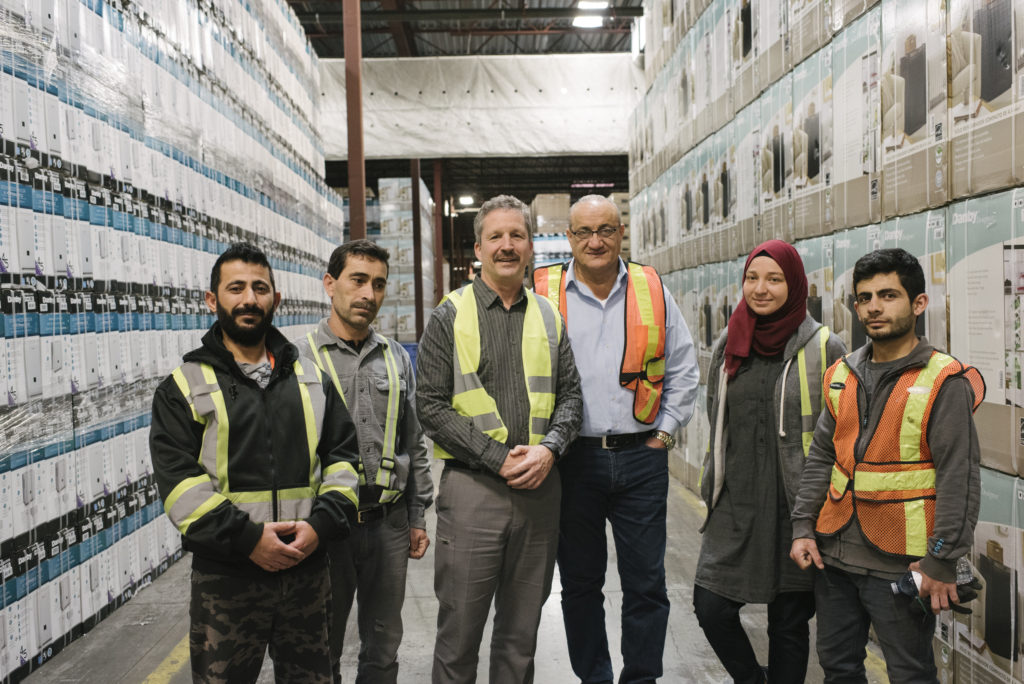#WelcomingEconomy: A New Campaign Touts the Benefits of Employing Refugees

While properly welcoming refugees requires public investment, the #WelcomingEconomy campaign hopes that the private sector can help as well.
There are over one million job vacancies across Canada which, with some support, refugees could help fill. Still, tapping into this talent pool may require adjusting employer recruitment and hiring practices.
To help employers connect with and hire refugees, the Refugee Jobs Agenda Roundtable and more than 50 other organizations, including World Education Services (WES), came together to develop a new advocacy campaign. Launched last month, the campaign, titled #WelcomingEconomy for Refugees, highlights the successes of refugees and the contributions they make to Canada’s economy and communities. It builds on earlier initiatives from the Roundtable, which is a multi-sectoral coalition of more than 80 organizations that was initially established to connect Syrian refugees with employment opportunities in parts of Ontario.
Given current labor shortages in Canada, the talents of refugees will be needed across the country. According to a recent Statistics Canada report, job vacancies rose in many industries and in all Canadian provinces and territories.
“Newcomers are key to addressing Canada’s labor force shortages, especially when there are more than one million unfilled job vacancies and the country’s working-age population is older than ever and close to retiring,” said Shamira Madhany, WES’ deputy executive director and managing director for Canada. She explained that the main goal of this campaign “is to encourage businesses to recruit and hire refugee talent by highlighting refugees’ social and economic contributions across Canada.”
One way the campaign is doing that is by amplifying the experiences of employers who have hired refugees. Their voices provide compelling evidence of the benefits that accrue not only to employers and the overall economy, but also to the refugees themselves.
An Opportunity, Not a Burden
While properly welcoming refugees requires public investment, the new campaign hopes that the private sector can help as well. By actively working to hire refugees, employers can help these newcomers find their footing, boost their own company’s productivity and morale, and unlock an underused pool of talent to power the nation’s economy.
Already, refugees make significant contributions to Canada’s economy. According to statistics from the United Nations High Commissioner for Refugees (UNHCR), within five years of their arrival, refugees join Canada’s middle class and their annual earnings increase steadily. “They also increase tax revenue, improve local worker wages, and boost innovation which stimulate the economy, raise productivity.”
Ruba Bilal, a regional manager at Acosta/Mosaic, a sales and marketing services provider, has seen the benefits of employing refugees firsthand. “In my experience the last five years, I hired more than 10 refugees in different business sectors. They always excel and thrive in their roles, ready to support, initiate, work hard, and always want to prove themselves.”
Refugees contribute to Canada’s economic vitality not just as employees, but as entrepreneurs and employers as well. For example, Marcelle Aleid and her mother came to Canada as refugees from Syria. Today, they are small business owners, opening and operating a restaurant that serves Syrian cuisine in midtown Toronto. Since opening the restaurant, they have hired many other refugees and newcomers.
“Around 90 percent of our staff is newcomers or refugees, they do not have experience, some have a disability, but all are eager to learn and improve,” Aleid said in a video interview.
Hanen Nanaa is another Syrian refugee who arrived in Canada in 2016. She and her colleagues later founded BAM, the Books Art Music Collective, to empower young people to get involved in civics through art. “Our skills and knowledge make us a valuable addition to Canada, enhancing the country’s economic, cultural, and social well-being,” she said.
Nanaa views the #WelcomingEconomy for Refugees campaign as a way “not just to celebrate refugees’ strength, courage, and success stories, but also to highlight the challenges we face every day such as racism and systemic discrimination when entering the workplace and starting our lives in new homes after fleeing violence and losing everything.”
Welcoming as a Key to Better Integration
For refugees, the process of resettling in a new country can be long and arduous. But finding a job quickly can rapidly accelerate their integration into their new community.
To help make that happen, the #WelcomingEconomy campaign website hosts resources for employers that not only highlight the benefits of hiring refugees, but also address some of the issues that can arise when recruiting or seeking to retain refugees. The campaign has developed resources that outline ways to remove barriers to refugee employment, address unconscious bias, and create a culture of inclusion for refugees in the workplace. The campaign also helps connect employers with refugees, maintaining on its website a list of platforms and organizations to reach out to refugees from different nationalities.
“Such campaigns will help in raising awareness across the business sector and employers that there is an additional pool of talent eager to learn, work, and participate in building our country and be part of it,” Bilal said, adding that “it also reminds the employers that hiring refugees will help the Canadian communities in reducing the unemployment rate and also helps in changing the stereotype against refugees.”

Danby Products Ltd, is a major advocate of helping and hiring refugees. Above, Jim Estill (centre) with Danby employees at the Danby warehouse in Guelph, Ont.
Jim Estill, president and CEO of home appliance manufacturer Danby Products Ltd, is a major advocate of helping and hiring refugees. Since 2016, he has sponsored and helped 80 Syrian refugee families resettle in Canada. More recently, he has committed to resettling Afghan refugees as well.
His company runs a remarkable program called Ease into Canada, which helps refugees, some of whom Danby Appliances has sponsored, learn English. Over the course of 90 days, refugees work with English tutors, attend English language classes, and complete English homework. They also gain Canadian job experience working at Danby Appliances. “The work is light industrial work that anyone can do for 90 days. And towards the end we assign a job coach. We do résumé writing. We help someone go onto the job boards and find out if there are other jobs that are more suitable for their skills,” he said.
Omar Salaymeh, CEO at Bonfire Interactive, an e-procurement company in Toronto, believes that being able to hire refugees really improves company morale and teamwork. “It allows us to use the company as a platform to do good, not through the products and services that we offer, but through initiatives like that. Also, when it comes to Canadian businesses in Canada, there is a great talent pool out there.”
He confirms that hiring refugees “has gone so well that we want to do it again with different refugee populations.”
The campaign plans to continue producing video interviews with business leaders that showcase their experience hiring refugees. They hope these videos increase awareness of the positive benefits that hiring refugees can have not just for refugees themselves, but for communities across Canada.
As Shamira Madhany at WES notes: “Refugees not only bring their education, skills, and experience to the workforce, but they also make significant cultural, intellectual, and political contributions to Canada.”